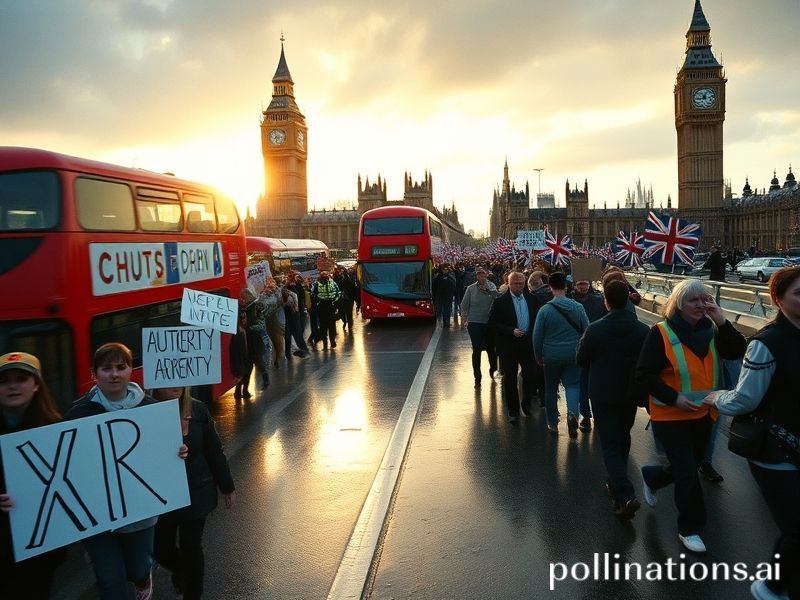London’s Latest Temper Tantrum: How a British Noise Ban Became the World’s Protest Starter Pack
The Thames looked unusually grey this morning, though to be fair it always looks like that. But today the pallor came with extra seasoning: tens of thousands of Londoners stomping across Westminster Bridge in the sort of choreographed outrage that makes the global WhatsApp groups buzz from Lagos to Lima. The trigger? A hasty government plan to criminalize “noise that causes annoyance,” a legislative Rorschach test that conveniently covers everything from Extinction Rebellion drums to the neighbor’s karaoke version of “Wonderwall.” Parliament, ever the fan of irony, had scheduled the final vote for the same day as the protest, presumably to save on policing costs by having both events in one postcode.
From a satellite’s indifferent perch, the march looked like an ant colony discovering a dropped éclair. Yet zoom in and you’ll spot the cosmopolitan garnish that turns a local tantrum into an exportable mood. French gilets jaunes high-vis mingled with Korean candle-lighters, Chilean students taught the Macarena of Dissent™, and a delegation of New Yorkers arrived fresh from LaGuardia duty-free to remind everyone that America still leads the world in slogan T-shirt technology. The message—shouted, sung, and Tik-Toked—was that London’s “annoyance” crackdown is merely the pilot episode of a series green-lit everywhere else. If Britain can outlaw being loud, the logic goes, Hungary can outlaw being left-handed and Florida can outlaw being under 65. Tyranny loves beta testing.
Watching from Berlin, where authorities recently tried to ban late-night pasta cooking as “olfactory protest,” one feels the warm, familiar embrace of déjà vu. The European Court of Human Rights is already clearing its throat; its caseload now reads like a Monty Python sketch titled “What Have the Romans Ever Let Us Do?” Meanwhile, in Hong Kong, veteran organizers sent encrypted tips on avoiding facial-recognition cameras, proving that the international protest franchise has better knowledge-sharing than most Fortune 500 companies. The city’s very own police commissioner, asked whether London could borrow some water cannons, replied, “Certainly, they’re only lightly used—mainly on weekends and public holidays.”
The economic subplot is equally farcical. The pound wobbled a whole 0.0003 percent against the dollar, a movement so microscopic it could be blamed on an overcaffeinated algorithm rather than 100,000 citizens demanding the right to shout. Still, the business press ran headlines like “MARKETS JITTERS AS CHAOS HITS CAPITAL,” because nothing sells like impending doom wrapped in a bowler hat. Analysts at Goldman Sachs issued a 300-page report concluding that civil liberties are “a depreciating asset class,” recommending a short position on democracy futures. Somewhere, a crypto bro minted an NFT of a protest sign reading “This Is Not An NFT” and immediately flipped it for the price of a modest flat in Croydon.
Of course, the real casualty is neither currency nor convenience but narrative coherence. Government spokespeople insisted the bill targets only “persistent, targeted harassment,” which sounds reasonable until you remember the Home Office considers six people with a tambourine to be a paramilitary cell. Opposition MPs countered that free speech is “the DNA of Britishness,” apparently forgetting Britain also invented the world’s first concentration camp. Meanwhile, television anchors kept asking whether the protest was “mostly peaceful,” as though the adverb still possessed any moral weight after 20 years of war-zone live shots. One suspects future linguists will date the death of “mostly” to this exact sentence.
By dusk, the crowd had dwindled to the hardcore and the merely unemployed, leaving behind a carpet of placards biodegradable enough to salve middle-class guilt. Street-cleaners—migrants on zero-hour contracts, naturally—swept up the debris so efficiently that the city could pretend nothing happened, like a blackout drunk waking up to find the flat spotless and a mysterious receipt from a flower shop. Yet the footage is already looping on every continent, soundtracked by local grievances. In São Paulo they chant against deforestation; in Tehran they swap tips on VPNs; in Sydney they argue over whether the London rain counts as cultural appropriation. One protest, many mirrors, infinite narcissism.
And so London hands the world another template for righteous anger, laminated for easy replication. The bill will probably pass, the decibels will drop, and some enterprising soul will sell noise-canceling earbuds emblazoned with the Union Jack. Progress, as ever, is just regression with better marketing. But somewhere a child who learned to spell “democracy” by reading cardboard signs will grow up remembering that streets can still belong to people, at least until the next firmware update.







